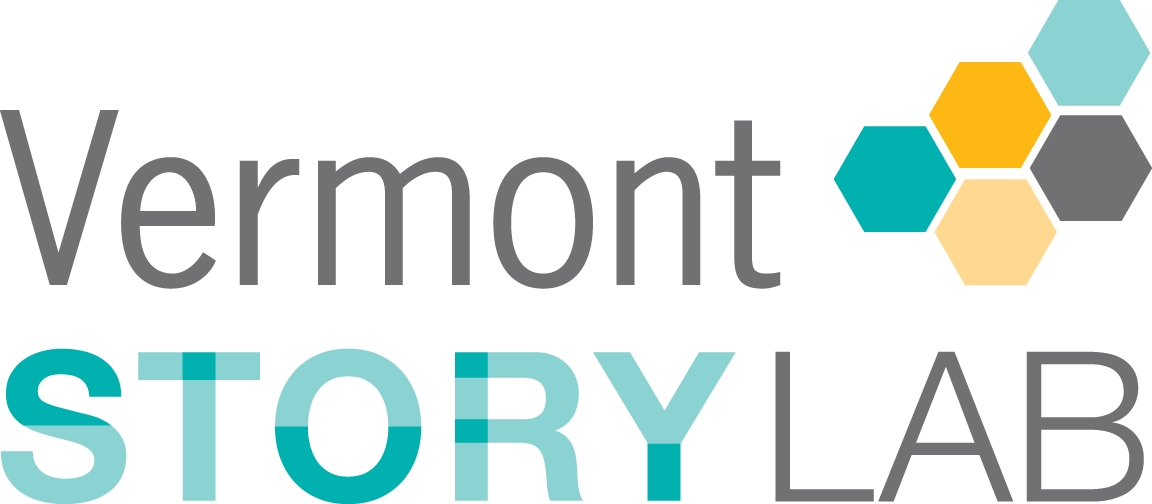Crafting & Using Stories that Challenge the Status Quo:
A Transformational Retreat for Nonprofit Storytellers
Thursday, September 19, 2019 • 9 am - 5:30 pm • Bread Loaf Mountain Campus, Ripton VT
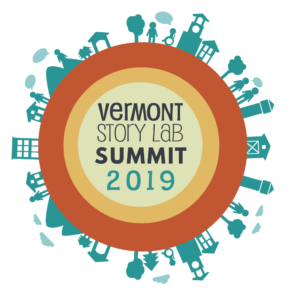
Check-in at Bread Loaf will begin at 9:00 am and the keynote will start promptly at 9:30 am. Following morning and afternoon breakout sessions, we’ll all gather for a Happy Hour at 4:15 and wrap-up by 5:30 pm.
Whether you’ve just started out as a storyteller, you’ve mastered the basics, or you’re a seasoned expert, you won’t want to miss the 2019 Vermont Story Lab Summit! Learn how to craft compelling stories for your organization or project. Then take the next step of framing those powerful vignettes into cohesive narratives that motivate people to act. Take a day at the idyllic Bread Loaf campus of Middlebury College with some of Vermont’s finest nonprofit communicators and reflect upon how you’re doing.
-
Pick up new story techniques to evolve your toolbox.
-
Build a unified narrative for your project or org.
-
Bask in excellent storytelling examples you can emulate.
-
Learn to tell stories that support values of diversity, inclusion and equity.
-
Bring your sidekick or team to build a culture of storytelling.
-
Flesh out new story ideas that push the status quo.
-
Rest your weary storytelling self with some restorative time.
-
Meet folks from across the state who love story as much as you do!
Crafting & Using Stories that Challenge the Status Quo

We’ll be guided by Emmy-nominated producer, documentary filmmaker and journalist, Sarah Astaire Springer, of Los Angeles. She will focus on the theme, “Crafting and Using Story to Challenge the Status Quo.” Breakout labs will follow her morning and afternoon keynotes where we get to practice and learn from one another.
Sarah began her career at CNN where she reported stories about race and identity in America with Soledad O’Brien’s “In America” series and has since worked as a producer for ABC’s Good Morning America, CBS/60 Minutes and VICE Media. Additionally, she oversaw creative direction and production for immersive, branded and linear series for RYOT Media in New York and Los Angeles.
Currently, Sarah works as a creative director and producer in unscripted and scripted development for production companies and labs on the East and West coasts. She was voted one of the 28 most powerful black people in media by Blavity, and serves on the leadership council of an organization composed of more than 100 media leaders. She promotes inclusion in the media space through Advocates for Inclusion in Media, an organization she co-founded that works to create safe environments, community and advocacy for underrepresented people in the industry.
Morning Labs: Crafting Stories to Create Change
Storytelling can have many different objectives. You may want to start a new program, find more volunteers, educate the community or push through legislation. These sessions match innovative strategies with specific objectives to inspire mission-focused stories. You will have the opportunity to attend two of the morning labs.
Join a conversation about the inherent challenges of fundraising and storytelling, and see how one Vermont nonprofit transformed its donor communications strategy. Learn how to set guiding principles which hold the vision for telling stories with integrity while supporting your annual goals.
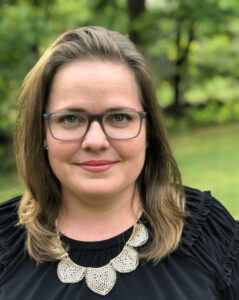 Cathie Pelchat works in fundraising and donor communications at the Vermont Foodbank. She is passionate about amplifying the voices of others and telling stories that not only move us to take action, but that also help move forward social change. Cathie’s work is built on the belief that, together, we can create a brighter and more equitable tomorrow. Cathie brings experience in philanthropy, facilitation and organizational development.
Cathie Pelchat works in fundraising and donor communications at the Vermont Foodbank. She is passionate about amplifying the voices of others and telling stories that not only move us to take action, but that also help move forward social change. Cathie’s work is built on the belief that, together, we can create a brighter and more equitable tomorrow. Cathie brings experience in philanthropy, facilitation and organizational development.
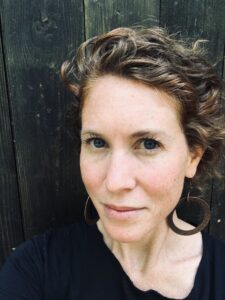 Mieka Carey works in donor communications and fundraising at the Vermont Foodbank. She believes in storytelling (and listening) as a way to strengthen human connection and relate more closely to the world around us. Mieka joins with a curious spirit and experience in philanthropy, publishing, and food service.
Mieka Carey works in donor communications and fundraising at the Vermont Foodbank. She believes in storytelling (and listening) as a way to strengthen human connection and relate more closely to the world around us. Mieka joins with a curious spirit and experience in philanthropy, publishing, and food service.
Society tends to repeat the same stories to the point where it’s sometimes easier to hum along even if we dislike the melody. How do we remove the ‘ear worm’ of society’s narratives about us, create our own tunes and tell our stories exactly the way we want them told? How do we know anyone will listen? Join two members of the Clemmons Family Farm for stories, songs and insights from Vermonters of African descent that might turn a few popular ideas about ‘diversity and inclusion’ on their heads and have us all humming a new and different tune!
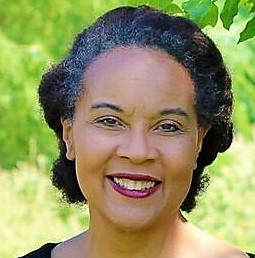 Lydia Clemmons, PhD, MPH is a medical anthropologist with 35 years of experience integrating arts and culture into the design and implementation of community health and development programs. Her experience includes extensive work with international donors and nonprofit organizations in the US and in 20+ countries in Africa. Lydia grew up on her family’s 148-acre subsistence farm in Charlotte, Vermont, which her family operated for decades, enriching their rural agricultural lifestyle with visual, literary and performing arts, and lots of storytelling. On top of her full-time international career, Lydia serves as Director of the Clemmons Family Farm in Vermont– one of the few Black-led arts and culture nonprofits in Vermont. She is Executive Director of the A Sense of Place project, a $350,000 creative placemaking program funded by Artplace America.
Lydia Clemmons, PhD, MPH is a medical anthropologist with 35 years of experience integrating arts and culture into the design and implementation of community health and development programs. Her experience includes extensive work with international donors and nonprofit organizations in the US and in 20+ countries in Africa. Lydia grew up on her family’s 148-acre subsistence farm in Charlotte, Vermont, which her family operated for decades, enriching their rural agricultural lifestyle with visual, literary and performing arts, and lots of storytelling. On top of her full-time international career, Lydia serves as Director of the Clemmons Family Farm in Vermont– one of the few Black-led arts and culture nonprofits in Vermont. She is Executive Director of the A Sense of Place project, a $350,000 creative placemaking program funded by Artplace America.
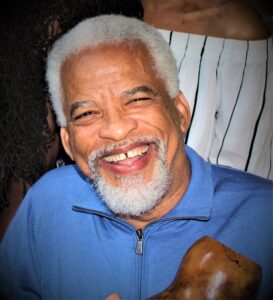 Michael Dyke, Composer, Musician, Storyteller
Michael Dyke, Composer, Musician, Storyteller
In a teaching and performance career spanning 40 years plus, Michael has toured the Caribbean, North and South America, Europe and Japan as a musician, musical director, sound engineer and researcher. He has composed music for the BBC, University of the West Indies, Diageo NorthLac and provided the BRIM method and the Dancehall kit for the music classroom. Michael has created music with and/or for Bob Marley’s band, the National Dance Theatre Company of Jamaica, The University of the West Indies Singers, and The Jamaican National Pantomime to name a few. He has lectured in and headed the departments of Popular Music Studies and Music Education at the Edna Manley College of the Visual and Performing Arts in Kingston, Jamaica. Michael is a Master Teaching Artist and part of the core team of artists engaged in planning, developing and leading the Clemmons Family Farm’s African-American/African diaspora arts and culture programming. Currently based in South Burlington, he and his wife, the acclaimed singer Judi Emanuel, together created the band Caribbean Rain whose music is deeply rooted in family traditions.
David Hohenschau
With examples from northern First Nations asserting their rights, small towns drafting comprehensive plans, and big cities dealing with climate change, we’ll talk about how stories can lay the foundation for transformative community visions, plans, and tough decisions.
Our stories are powerful motivators and change makers. Appreciative Inquiry is a system that uncovers what is working well in an organization and uses that information to inform future action. In this workshop, you’ll discover how AI gathers and works with stories to develop strategies that help organizations, institutions, towns, projects and people move forward in positive transformation.
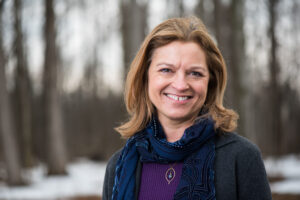
Fran Stoddard, Communications Consultant
I’m passionate about stories that motivate change. As a media producer for Vermont Public Television, Vermont Public Radio, and WVNY-TV, I have been gathering and telling stories for many years. As a freelancer, I have helped non-profits and businesses tell their story via newsletters, blogs, video and photography. As a college instructor, I enjoyed guiding students in story development and production. Recently, I have been telling stories about communities across the US for the Orton Family Foundation.
Marlon Fisher, Stephen Kiernan, Jorge Yagual, Janet McLaughlin, Rev. Mellen Kennedy
We know! When it comes to getting the rest of your team onboard with telling your story, the joys and frustrations abound. Join a panel of social impact pros formatted in the style of NPR’s Wait, Wait, Don’t Tell Me to discuss the frustrations and fruits of getting your staff, leadership, and board onboard to tell key stories for your organization.
Grant writing doesn’t have to be painful–in fact it can be joyful! The best grant proposals reflect the transformative power of the work you do and the joy and passion that you bring to the work. A former grantmaker and yoga instructor will lead this session that applies the contemplative and connective nature of Yin yoga to the art of grant writing for those willing to venture outside their comfort zone. This session is accessible to anyone.
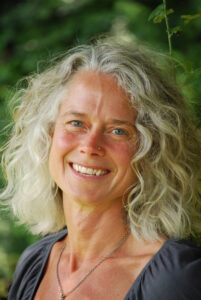 Jen Peterson, E-RYT, Reiki Master
Jen Peterson, E-RYT, Reiki Master
Former Annual Fund Director for Planned Parenthood and Vice President of Program and Grants at the Vermont Community Foundation, Jen has also been studying and practicing yoga and meditation for more than 11 years. In 2017, she left a 25 year career in nonprofit development to start her own business, Yoga Grace, as a yoga therapist. She has over 1000 hours of yoga teaching experience and has been instructing and sharing yoga since 2012.
Lunch -- Healthy food and opportunity to network with 200+ storytellers!
Afternoon Labs: Getting the Stories Out
Which are the most effective platforms in a media landscape that constantly changes? These sessions offer new ways to use media (from Front Porch Forum to live stream to street murals) and creative ideas to integrate one coherent story across many platforms. Unless otherwise mentioned, you will have the opportunity to attend two of the labs below.
Live Video can help you to be more authentic with your community. Learn how to share your successes and challenges in real time and encourage stronger bonds between your mission and your network. This is a double session.
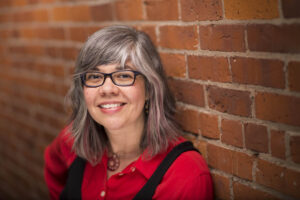 Gin Ferrara, Community Engagement Manager, RETN at the Media Factory
Gin Ferrara, Community Engagement Manager, RETN at the Media Factory
Gin considers herself a “multimediator” — a person who helps folks use media to tell their own stories and connect to their communities. She has taught storytelling, videomaking, and digital media to young people and community members across the country, and is thrilled to call Vermont home since 2011. Gin enjoys creating new projects, and is the co-founder of Baltimore’s Wide Angle Youth Media, the nonprofit communications company Spindle & Widget, and the Burlington story community Storytelling VT. Recently, Gin became a radio programmer and is co-host of “The Upside,” an upbeat and offbeat talk and music show on a weekly theme, on 99.3FM WBTV-LP.
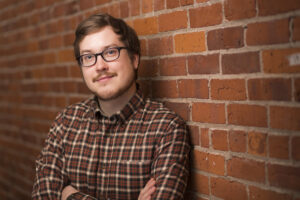 Ross Ransom, Education Coordinator, RETN at the Media Factory
Ross Ransom, Education Coordinator, RETN at the Media Factory
Ross first started producing video while in school in New York. Ross’ passion for teaching community media was solidified during an internship at RETN while completing his degree at Champlain College. Ross strives to help the community tell their stories by making it simple and fun to learn videomaking. Ross enjoys a variety of outdoor activities year-round, making music, and believes in local, dissenting, unfettered, informative, and accessible media productions.
By making a vox pop or “person on the street” piece together, we’ll demystify the art of audio stories and learn how to ask the right questions to draw out the best stories.
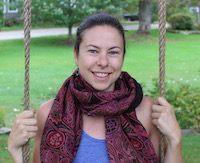 Mary Wesley
Mary Wesley
Mary Wesley is a digital storyteller and explorer of folk culture. At the Vermont Folklife Center she is an Education and Media specialist and also the host of the VFC’s own podcast, “VT Untapped.” Mary attended the Salt Institute for Documentary Studies to learn radio production and Multimedia Storytelling. In collaboration with the Country Dance and Song Society, she helped conceive and manage a community storytelling project, collecting oral histories in traditional dance and music communities around New England. She has worked with other Vermont non-profit organizations including Young Tradition Vermont and the Wake Up to Dying Project to create opportunities for community education and engagement through stories.
Learn the basics of telling a good story orally. Plus: Explore how to adapt, edit, and augment your when you are sharing your story with a disinterested, reluctant, or opposing audience. How do you break through?
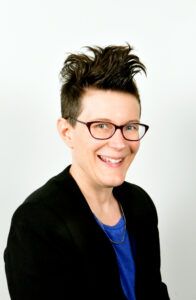 Charlotte Blend
Charlotte Blend
Charlotte Blend is the Communications and Foundations Coordinator at Lund where she has multiple opportunities to tell stories – in grant proposals, outreach materials, meetings with donors, community presentations and on the fly to anyone who asks and those who don’t!
Volume counts in legislative persuasion. How do you bring a group of people together around a narrative and channel that to have an impact on systemic change? This session shares the key elements one nonprofit used narrative to build community and shift state-wide policy.
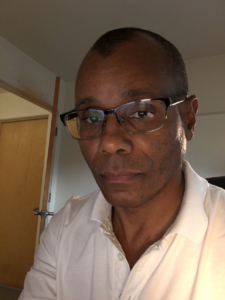 Mark Hughes
Mark Hughes
Mark Hughes is the Executive Director of Justice For All, which peruses racial justice within Vermont’s criminal justice system through advocacy, education, and relationship building. JFA led a Coalition that orchestrated the successfully passage of Act 54 (2017), a bill that created a panel to address racial disparities in the justice system and a task force to investigate racial disparities in all other systems and Act 9 (2018), a bill that created a Statewide Racial Equity Panel and Executive Director. Mark is former Tri-Chair of the Vermont chapter of the Poor People’s Campaign: A National Call For Moral Revival and former Vice-chair of the Racial Disparities in the Criminal and Juvenile Justice System Advisory Panel. An Iowa native, he has resided in Vermont for the past ten years
Jill Allyson Badolato, Burlington City Arts
Looking to embed your stories in the community? Try an art-based storytelling approach involving your neighbors and landscape to create a visual narrative that moves your mission forward. This session introduces you to the impact of art in storytelling, from street murals to lawn signs to Instagram.
So often, we think of storytelling as an opportunity to promote our “brand” and put a human face on our work to funders. Spend some time with a master storyteller and Moth producer and learn how to create collaborative connected partnerships between recipients and service providers using authentic, own-voices storytelling in all its messy glory. Participants will discuss the power of first-person true narrative and its transformative impact on tellers and listeners alike.
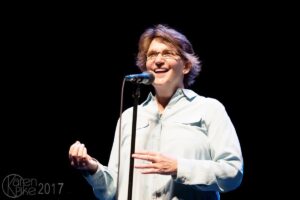 Susanne Schmidt
Susanne Schmidt
Susanne Schmidt is a comedic storyteller, Moth producer and an international speaker. Her work has been featured on CBS Sunday Morning, The Moth, National Public Radio, Stories from The Stage, and HBO’s Inspiration Room. In 2015, Susanne was named the “Best of the Valley Voices” by New England Public Radio.
A teaching artist and organizational consultant, Susanne draws on her experience as a mental health professional to assist non-profits, groups and individuals embrace the power of true first person narrative.
In addition to her work as a consultant and performer, Susanne is a graduate professor of clinical mental health counseling at Northern Vermont University and the mother of two amazing young men, who would probably prefer that she stop talking about them on stage. www.susanneschmidtstories.com
Walk into the woods and ground into the present moment to take a step back from the details of storytelling. Journey with mindfulness and experience a story of transformation. Explore the importance of creating the space to feel emotions, express vulnerability, shift perceptions, and alter narratives.
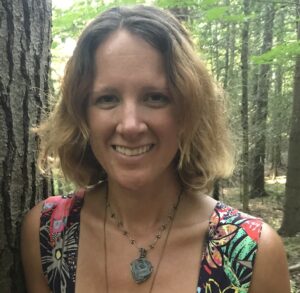 Rae Carter
Rae Carter
Rae Carter is an advocate, coach, facilitator, herbalist, musician, strategist, speaker, and writer committed to co-creating heart-centered social change that honors the cycles of nature with compassion and empathy for all living beings. She is reinventing her career following a transformational healing journey from cancer. Rae serves on the VBSR Board of Directors and lives in Plainfield. Her 20-year career includes serving as the communications director at the Vermont Sustainable Jobs Fund, owning a Vermont public relations business, and working with clients in agriculture, tourism, food, finance, education, consumer service, government municipality, and nonprofit sectors. Connect with her socially: RaeCarterEmpowr
Happy Hour and Q & A with Sarah Astaire Springer
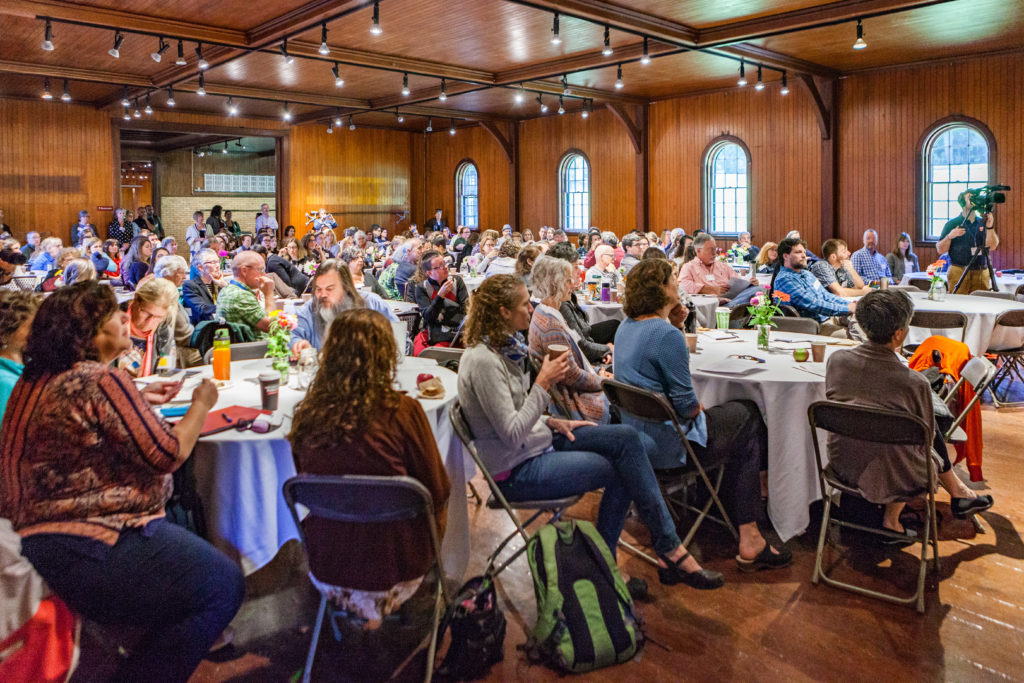
One of the most valued takeaways from our Summits are the connections folks make with storytellers from across the state. Join us for a relaxed Happy Hour featuring an intimate Q & A with our keynote speaker, Sarah Astaire Springer. Whether you’re a networking extrovert, or a 1:1 introvert, give yourself a chance to explore personal connections that will help you return to work encouraged, refreshed, and ready to create change.
Register Today!
We WILL sell out, so don’t wait. As is our practice at VSL, we promise to deliver a day that is hands-on, interactive, experimental, pushing the envelope, and chock full of new story forms and excellent examples from Vermont nonprofits and beyond.
The Summit welcomes nonprofit leaders and communicators, grassroots activists, faith-based groups, state agencies, and individuals interested in developing their storytelling capabilities. We plan to offer a wide range of content that challenges storytellers at all levels of experience.
Registration fee is $75.
Bread Loaf Campus of Middlebury College
Directions
The Bread Loaf campus is a 20-minute drive from Middlebury in the Green Mountains. The GPS location found in most Internet map tools is 4229 Route 125, Ripton, Vermont 05766 NOTE: Bread Loaf campus is not near Middlebury main campus.
Parking
Most buildings are within walking distance of the center of campus. Parking is available next to the main Barn and in the private driveways of the outer houses. Parking on Route 125 is strongly discouraged for safety reasons.
The Vermont Story Lab Summit is supported by grants from the Vermont Community Foundation, The Fountain Fund and anonymous donors.
